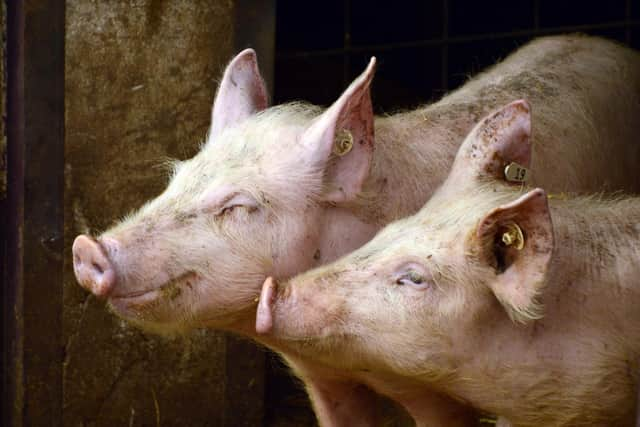Edinburgh University develops gene-edited pigs resistant to disease
Researchers at the university have produced pigs which can resist a respiratory disease affecting livestock worldwide.
Porcine Reproductive and Respiratory Syndrome (PRRS) is one of the most expensive animal diseases in the world, with around £1.8 billion revenue lost each year in the US and Europe.
Advertisement
Hide AdAdvertisement
Hide AdThe disease causes breathing problems and deaths in young animals and can result in pregnant sows losing their litters.


By editing the genetic code of the animals, researchers have been able to avoid the virus, which has not been conquered by vaccines.
The Roslin Institute, has now signed a licensing agreement with Genus, facilitated by Edinburgh University’s commercialisation service, Edinburgh Innovations.
Genus will now continue planned work for testing multiple generations of pigs and conducting studies required for FDA approval.
Professor Bruce Whitelaw, Interim Director of the Roslin Institute and Dean of Innovation at the University’s College of Medicine and Veterinary Medicine, announced the agreement to mark 25 years after the Dolly the Sheep breakthrough.
He said: “Roslin is rightly recognised for pioneering animal biotechnology that enables genetic engineering of farmed animals.
"The strong, productive and durable partnership with Genus has been a key aspect in seeing academic endeavour translate to useful and useable translational projects for the livestock sector.”
Dr Elena Rice, Chief Scientific Officer at Genus PLC, said: “We have long and fruitful relationships with
Advertisement
Hide AdAdvertisement
Hide AdRoslin and admire the depth of Roslin’s research and pioneering spirit.
"Together we laid out the groundwork for combating PRRS, and Genus is working with the FDA to obtain approval for this technology.”
Dr John Lonsdale, Head of Enterprise at Edinburgh Innovations, said: “Animal health is a keystone of
animal welfare as well as bringing benefits to food-producing economies and global food security.
“This highly specific edit to the animals to ensure disease resistance is a result of decades of work at
Roslin, and we’re delighted to be helping to improve animal welfare by bringing this technological
breakthrough to market through this partnership with Genus.”
A message from the Editor:
Thank you for reading this article. We're more reliant on your support than ever as the shift in consumer habits brought about by coronavirus impacts our advertisers.
If you haven't already, please consider supporting our trusted, fact-checked journalism by taking out a digital subscription.
Comments
Want to join the conversation? Please or to comment on this article.
